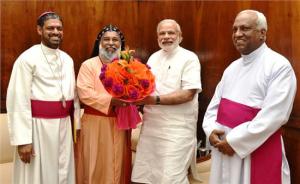Jurist calls Kandhamal book a wake-up call for nation
Though Maoists had claimed responsibility, the book points out, prosecution chose to indict Christians.
 |
Bengaluru:A book investigating the sequence of events connected with anti-Christian violence in Odisha’s Kandhamal district is a “wake up call” for the nation, says Advocate-General of Karnataka Ravivarma Kumar.
“The content of the book has grave implications for Indian democracy,’ Kumar said while releasing the book, ‘Who killed Swami Laxmanananda?’ on July 23 in Bangalore.
Journalist Anto Akkara authored the book after several years of research and studies on why seven Christians were convicted for the murder despite courts having no adequate proofs.
Kumar, the senior lawyer noted that the Christians were given life terms despite the fact that there was “no eyewitness to the murder and hardly any evidence.”
The murder on Aug. 23, 2008 triggered the violence against Christians claiming nealry100 lives. The three-month long pogrom also destroyed 300 churches and displaced some 56,000 Christians as Hindu fanatics torched 6,000 Christians houses. The violence was result of an orchestrated rumor that the swami’s murder was a Christian conspiracy.
In dealing with the pogrom and the cases related to it, “the legislature and the executive have lost credibility, and the Judiciary is the last bastion of hope for the nation,” Kumar said.
“A disaster is unfolding on the nation. We need to wake up, even if just five of us or a handful, and we must fight any injustice so that justice is upheld,” the senior advocate said.
Jesuit Father Ambrose Pinto, a social analyst, referring to how the author has proved that the Swami’s murder and subsequent conflagration was a well-planned conspiracy, said the book “lays out the agenda of hate of the Sangh Parivar.”
He recalled that the Sangh Parivar had been associated with anti-national activities and the spreading of hate since pre-Independence times. They had cooperated with the colonizers, were active in anti-Muslim violence during Partition, and later in Gandhiji’s assassination.
The author with a multimedia presentation, claimed contract killers were engaged to murder of the swami and innocent Christians – six of them illiterates – were convicted to life imprisonment by a fraudulent trial. The effort is to perpetrate the fraud that the swami’s murder was a Christian conspiracy.
“The conviction of the seven innocents without a shred of evidence against them is a blot on the judicial system of the country,” lamented Akkara urging all present to sign the online petition for their release at http://www.release7 innocents.com.
Though Maoists had claimed responsibility, the book points out, prosecution chose to indict Christians. The book shows how the Sangh Parivar had engineered the violence, hoping the federal government would dismiss the Odisha government in which the BJP was a coalition partner then. That would have given them advantage in the national elections in 2009, the book reasoned.
But alerted to this game-plan by intelligence reports, the UPA government refrained, derailing the Sangh’s wild expectations, Akkara claimed.
 Cardinal Robert Sarah, prefect of the Congregation for Divine Worship and the Sacraments, speaking at the National Catholic Prayer Breakfast in Washington, May 17 (CNS photo/Bob Roller).
Cardinal Robert Sarah, prefect of the Congregation for Divine Worship and the Sacraments, speaking at the National Catholic Prayer Breakfast in Washington, May 17 (CNS photo/Bob Roller).

You must be logged in to post a comment.